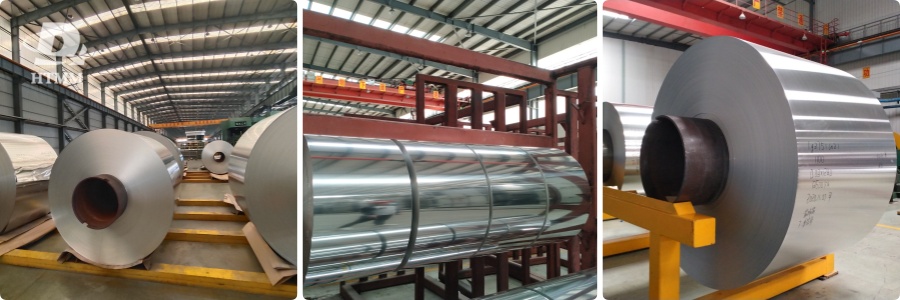
The versatility of 8011 foil will be demonstrated through case studies that highlight its benefits for real-world processing and quality. All things considered, ordering the 8011 aluminum foil offers opportunities to save costs, simplify complex packaging line operations, and enhance the quality of the finished product.
Comprehending the Composition of Alloys
Let's start with an overview of the unique alloy chemistry of 8011 aluminum foil, which allows for qualities that set it apart from regular aluminum:
Magnesium (1.2%): Mg atoms boost mechanical qualities, such as increased tensile strength, and are a solid solution strengthening element.
- 0.8% Manganese: Mn promotes work hardening ability for improved formability by acting as a recrystallization inhibitor during rolling and slitting.
1.5% Chromium: Essential to 8011 aluminum foil, Cr reduces hot shortness to enable wider annealing/processing windows and heat sealing parameters.
In comparison to non-heat seal grades like 3003, this 8011 aluminum foil composition improves microstructure characteristics and enhances formability and thermal stability during heat sealing procedures.
Resistance to Warm Shortness
One of the primary drawbacks of basic aluminum alloys is their susceptibility to hot shortness, a condition where high temperature grain development results in early recrystallization and diminishes the work hardening effects that are critical for stretch forming. Independent studies show that whereas 3003 alloy has a maximum tolerance of 450°C for heat sealing, 8011 heat seal aluminum foil can withstand heat sealing up to 500°C before recrystallization starts.
Chromium stabilizes grain boundaries, preventing recrystallization from starting too soon and allowing for up to 30% bigger heat sealing windows to form reliable, strong seals at lower pressures and dwell times—a key factor in throughput increases. Overall production tolerance for temperature variations enhances QC performance.
Experiments in the lab have shown that 8011 heat seal aluminum foil has improved mechanical characteristics. 8011 foil may reach tensile yield strengths of up to 36,000 pounds per square inch (kpsi), according to independent studies. This is about 20% greater than the typical 3003 grade rating of a maximum of 29 kpsi.
Increased power, also known as tensile strength, has many benefits for packaging applications that use heat sealing. First of all, it enables foil producers to possibly thin the 8011 foil utilized without sacrificing other essential characteristics like the foil's ability to operate as a barrier against liquids and gasses. Additionally smaller in weight, thinner foil saves money on materials and shipping.
Because 8011 foil has a higher strength, package designers may make more intricate package designs during the thermoforming process, which entail deeper draws and longer draw ratios. Thus, the range of possible package designs that might be produced is increased. Furthermore, by decreasing the likelihood of inadvertent openings or leaks through seals, the increased peel and burst forces produced by 8011's strengthened strength improve product containment.
The strong tensile properties of 8011 foil help manufacturing facilities that rely on heat sealing as a fundamental component of their production process to optimize output quantities and manufacturing capabilities. Enhancing the aluminum foil's basic tensile strength can further enhance its benefits in terms of processing and quality.
Superior Formability

Beyond strength measurements, the work hardening capability of 8011 aluminum foil allows it to actually excel in plastic working abilities:
- Independent research indicates that compared to comparable thick 3003 alloy grades, 8011 requires 15-20% less forming power.
- After extensive drawing/stretch creating 8011, almost no discernible springback was seen, compared to 2-3% for 3003.
- During forming, wrinkle/tear resistance improves, enabling 8011 to create more complex forms with fewer flaws.
This significant formability advantage leads in simpler, quicker production that requires less calibration modifications between batches to produce complex laminates, trays, and wraps consistently.
Improved Heat Sealing
During essential heat sealing, the following downstream benefits result from chemistry adjustments that enable hot shortness resistance:
- Independent analyses demonstrate that, with similar manufacturing conditions, 8011 foil achieves sealing strengths 15–30% higher than reference 3003 foil.
- 8011 shows almost the same seal strength at temperatures as usual practice with ordinary aluminum, even at 30°C lower, allowing for time and/or energy savings.
- Compared to brittle 3003 seals, 8011 generates seals with observably smoother, less stressed surfaces that withstand delamination stresses from bending or vibration.
Because of their adaptability and resilience, these sealing features increase filling and wrapping line productivity by lowering reject rates and optimizing settings.
Better Barrier Characteristics
Permeation benefits are demonstrated by independent research, in addition to mechanical properties:
- Denser metallization preventing micropores is responsible for the 25–30% reduced oxygen transmission rate through 8011 grades compared to 3003 grades.
Water vapor permeability was estimated to be 10-15% better than 3003, guaranteeing that packaged goods stay fresher for longer on the shelf.
- Up to 20% better grease/fat barrier than reference 3003, avoiding flavor transfer, stopping leaks, and maintaining shelf appeal.
Compared to conventional aluminum, these barrier augmentations offer formulation protection and shelf life extension, allowing for the formulation of more delicate products.
Thanks to its unique metallurgical makeup, the 8011 1235 aluminum foil grade—which is especially optimized for heat sealing functions—performs noticeably better than other aluminum alloys. By offering unquestionable industrial benefits through better formability, strength, barrier characteristics, and heat stability during sealing applications, 8011 simplifies otherwise intricate packaging processes. 8011 is perfect for assisting industrial and brand owners with their strategic efforts because of its adaptability and sustainability alignment. All things considered, 8011 offers a cutting-edge response to complex foil-based packaging requirements.

